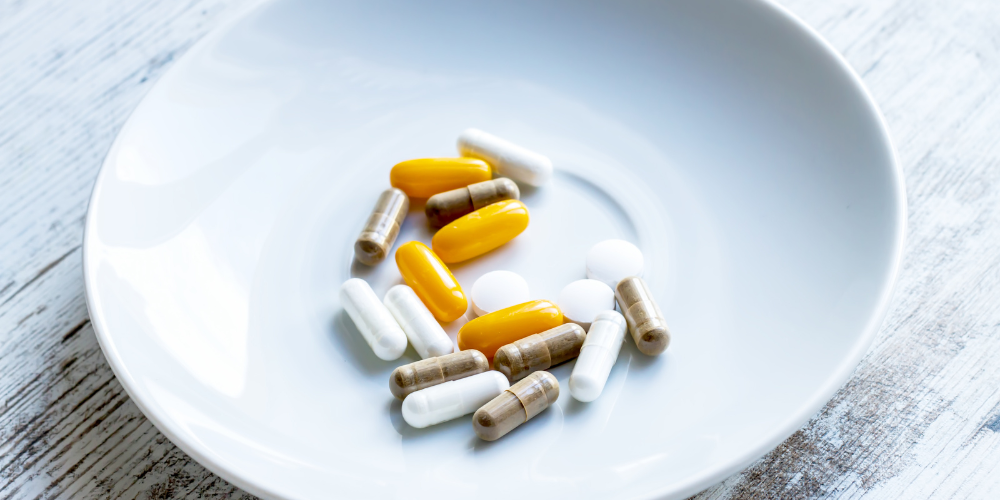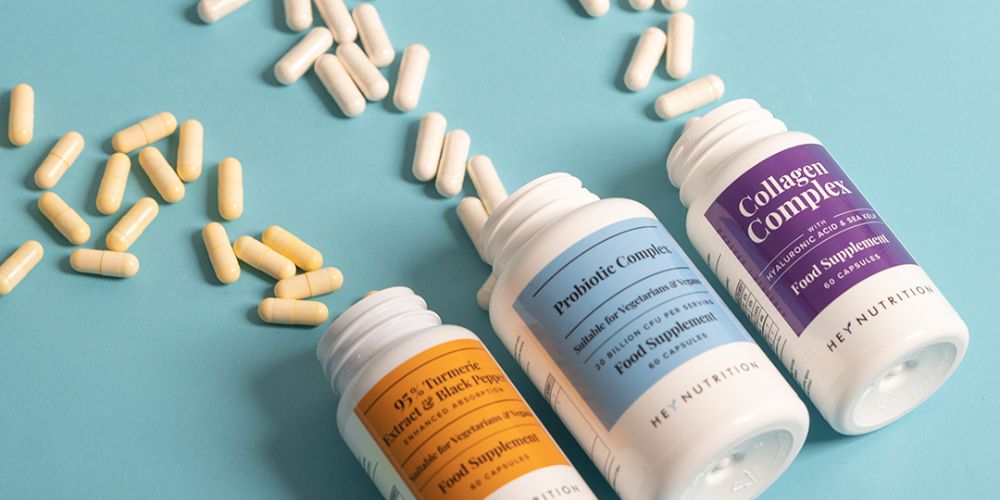
7 Ways to Boost Your Immune System Naturally
We’re well into cold and flu season, but there’s always time to boost your immune system.
Read on to get to know your immune system and ways you can boost your immune system naturally.
Your Immune System & Why It’s Important
The immune system’s goal is to keep us as healthy as possible.
It’s defined as “a complex network of cells, tissues, organs, and the substances they make that help the body fight infections and other diseases.”[1]
Your immune system is always learning, which is called acquired or adaptive immunity. When exposed to a new germ for the first time, your immune system tries to fight it off. You may get sick, but once your immune system learns the new germ, it will remember it and be able to fend it off if it were to ever return.[2]
When your immune system is healthy and strong, it can better fight off all the harmful stuff and protect your body. So how do you maintain a healthy immune system?
7 Ways to Naturally Boost Your Immune System
Boosting your immune system naturally can be as easy as making a few lifestyle changes..
Keep reading to check out a few of them:

Get Enough Sleep
Health and sleep quality are closely linked.
A study found that adults who get fewer than six hours of sleep each night are more likely to catch a cold than those who sleep more.[3]
Enough quality sleep can help strengthen your immune system—Have you noticed that when you’re sick, you tend to sleep more? That is because it allows your immune system to fight the illness.[4]
If you’re having trouble getting quality sleep, practice good sleep hygiene, like limiting screen time, keeping your room dark, using a sleep mask, and trying to go to bed at the same time.
Get Your Body Moving
Moderate exercise is the name of the game.
Moderate exercise can boost your immune system. It can also help reduce inflammation and aid in regenerating immune cells regularly. But keep in mind, prolonged and intense exercise can suppress your immune system. So go easy on yourself.[5]
Try bicycling, swimming, jogging or brisk walking, or (light) hiking.

Drink Plenty of Water
Dehydration can lead to headaches, which in turn, can lead to hindering your physical performance, mood, focus, heart and kidney function, and digestion. These issues can cause you to be increasingly susceptible to illnesses.[6] Staying hydrated is essential for your overall health.
How much water you should drink generally depends on you—drink when you’re thirsty, stop when you’re no longer thirsty. Increase your water intake if you intensely exercise, work outside, or live in a hot environment.[7]
Change Up Your Diet
Healthy eating provides the nutrients you need to support your immune function.[7,8] Here are a few things to implement into your diet:
Whole Plant Foods: Fruits, vegetables, legumes, nuts, and seeds
These foods have nutrients and antioxidants that can help combat free radicals and decrease inflammation. The nutrients in fruits and vegetables can help reduce the duration of a cold, as well.[9,10]
Fermented Foods: Yogurt, kimchi, sauerkraut, kefir, natto.
These foods are rich in good bacteria—called probiotics—which your body needs to maintain a healthy gut.[11] Research shows that all of that good bacteria can help your immune cells tell the difference between healthy cells and harmful organisms.[12]
Healthy Fats: Olive oil, salmon, chia seeds
Healthy fats may help boost your immune system’s response to harmful germs by decreasing inflammation. Chronic inflammation tends to suppress the immune system.[13]
Limit Added Sugars:
Recent evidence suggests that refined carbs and added sugars play a role in obesity, which can increase your risk of getting sick. Limiting those foods can help decrease inflammation and help with weight loss, which results in a reduced risk of chronic health conditions.[14,15,16,17]
Ideally, your sugar intake should be less than 5 percent of your daily calories.

Managing Stress
Short-term stress is important for the body in terms of establishing survival mechanisms during fight-or-flight situations. Long-term stress, however, can promote numerous health issues, such as inflammation and imbalanced immune cell function. Therefore, managing your stress levels is a major key component of maintaining a healthy immune system.[18,19]
Do whatever makes you happy and puts you at ease. Mindful practices you can try include journaling, yoga, or meditation. Try escaping for a minute in a book. If you think you would benefit from it, try talking with a therapist or counsellor.
Break Unhealthy Habits
While sometimes it’s easier said than done, breaking unhealthy habits such as smoking or drinking excess alcohol can play a role in boosting your immune system.
Smoking and excessive alcohol use tend to make your body less likely to fight diseases.[20,21]

Supplements
In some cases, your immune system just needs a little help. Studies have shown that adding some supplements to your health routine can help strengthen your immune response.
Here are a few to keep in mind:
Vitamin C:
Vitamin C is an antioxidant that can help protect your cells against free radicals. Your body doesn’t produce vitamin C on its own. Therefore, you need to get it from your diet or through supplements.
While vitamin C doesn’t prevent colds, it can help when you have one. One study showed that taking vitamin C daily can help reduce the duration of colds by 8 percent in adults and 14 percent in children.[22,24]
Get your daily dose of vitamin C and boost your immune function with our Natural Vitamin C Complex. Our unique formula delivers a potent dose of vitamin C through 100% natural sources, including Rosehip, Acerola Cherry, Blackcurrant, Guava and Pomegranate. Our Natural Vitamin C Complex provides a potent daily dose of vitamin C to help boost your immune system, protect the body from oxidative stress, improve metabolic health, reduce tiredness and fatigue, and more.
Vitamin D:
Vitamin D has antioxidant and anti-inflammatory properties that help support immune health.
If you’re deficient in vitamin D, your chances of getting sick can increase. Therefore, supplementing with vitamin D can help counteract this problem.[23]
When combined, vitamin D and vitamin K are a true power couple. D and K vitamins are well known for being modulators of the immune system, acting as anti-inflammatory powerhouses, and even supporters of healthy immune responses.[26,27,28]
Our Vitamin D3 & K2 MK-7 is a powerful supplement that combines two essential nutrients with medium chain triglycerides (MCT) to amplify absorbency. Check out our Vitamin K2 & D3 supplement, formulated with MK-7 and enhanced absorption properties, by clicking here.
Zinc and Magnesium:
This nutrient is found all throughout the body and is important for immune and metabolism functions. Supplementing with zinc has been shown to help reduce the longevity of a cold by 33 percent.[25,29]
Our Magnesium Complex with added Zinc contains potent doses of 3 different forms of highly bioavailable Magnesium, 2 types of zinc, and an optimum dose of vitamin D3. Our custom formula has been designed to provide you with all the benefits of Magnesium & zinc, while ensuring optimal absorption and better results than competing brands, so you can take full advantage of the many health benefits it has to offer.
Apple Cider Vinegar:
Apple cider vinegar is a staple product in many kitchens, and it also comes in supplement form. For centuries, Apple Cider Vinegar has been used as a remedy for numerous health concerns, including gut health, immune function, digestive health, and more.[30]
Our delicious Apple Cider Vinegar Gummies with added Vitamin C and Chromium help to support normal blood sugar levels, promote a healthy macronutrient metabolism, contribute to skin health, support immune function, and more.
Probiotics:
Remember those probiotics we discussed earlier? If your diet is lacking in fermented foods, a probiotic supplement can support with your immune function (with the help of Zinc).
Our Probiotic Complex’s unique formula helps to establish optimal health where it matters the most: in the gut. It effectively works on supporting immune health and your digestive enzymes, so you can establish body harmony and feel great every day. Check out our Probiotic, containing 20 billion CFUs and 7 probiotic strains, by clicking here.
Multivitamins:
Multivitamins are your all-in-one health supplement. Those that contain optimal levels of vitamins B6, C, and D provide antioxidants and immune support.
Evidence suggests that a multivitamin may improve immune function, especially in those 55 and older.[34]
Our Multivitamin consists of 13 key vitamins, plus additional minerals to establish optimal health. Our formula contains ingredients that are clinically proven to help boost energy, promote cardiovascular health, support immune function, improve metabolism, and more. Check out our Multivitamin, which contains a high potency of 19 essential vitamins and minerals, by clicking here.

Ready to transform your health, and help out your immune system along the way? Check out our line of HeyNutrition supplements by clicking here. And check out the rest of our blogs for even more health tips.
Resources:
- National Cancer Institute at the National Institutes of Health. (n.d.). NCI Dictionary of Cancer terms. National Cancer Institute. Retrieved November 17, 2022, from https://www.cancer.gov/publications/dictionaries/cancer-terms/def/immune-system
- InformedHealth.org [Internet]. Cologne, Germany: Institute for Quality and Efficiency in Health Care (IQWiG); 2006-. How does the immune system work? [Updated 2020 Apr 23]. Available from: https://www.ncbi.nlm.nih.gov/books/NBK279364/
- Prather, A. A., Janicki-Deverts, D., Hall, M. H., & Cohen, S. (2015). Behaviorally Assessed Sleep and Susceptibility to the Common Cold. Sleep, 38(9), 1353–1359. https://doi.org/10.5665/sleep.4968
- Besedovsky, L., Lange, T., & Haack, M. (2019). The Sleep-Immune Crosstalk in Health and Disease. Physiological reviews, 99(3), 1325–1380. https://doi.org/10.1152/physrev.00010.2018
- Simpson, R. J., Kunz, H., Agha, N., & Graff, R. (2015). Exercise and the Regulation of Immune Functions. Progress in molecular biology and translational science, 135, 355–380. https://doi.org/10.1016/bs.pmbts.2015.08.001
- Centers for Disease Control and Prevention. (2022, June 6). Water and healthier drinks. Centers for Disease Control and Prevention. Retrieved November 17, 2022, from https://www.cdc.gov/healthyweight/healthy_eating/water-and-healthier-drinks.html
- Childs, C. E., Calder, P. C., & Miles, E. A. (2019). Diet and Immune Function. Nutrients, 11(8), 1933. https://doi.org/10.3390/nu11081933
- Christ, A., Lauterbach, M., & Latz, E. (2019). Western Diet and the Immune System: An Inflammatory Connection. Immunity, 51(5), 794–811. https://doi.org/10.1016/j.immuni.2019.09.020
- Serafini, M., & Peluso, I. (2016). Functional Foods for Health: The Interrelated Antioxidant and Anti-Inflammatory Role of Fruits, Vegetables, Herbs, Spices and Cocoa in Humans. Current pharmaceutical design, 22(44), 6701–6715. https://doi.org/10.2174/1381612823666161123094235
- Hemilä, H., & Chalker, E. (2013). Vitamin C for preventing and treating the common cold. The Cochrane database of systematic reviews, 2013(1), CD000980. https://doi.org/10.1002/14651858.CD000980.pub4
- Ozen, M., & Dinleyici, E. C. (2015). The history of probiotics: the untold story. Beneficial microbes, 6(2), 159–165. https://doi.org/10.3920/BM2014.0103
- Wu, H. J., & Wu, E. (2012). The role of gut microbiota in immune homeostasis and autoimmunity. Gut microbes, 3(1), 4–14. https://doi.org/10.4161/gmic.19320
- Dhabhar F. S. (2014). Effects of stress on immune function: the good, the bad, and the beautiful. Immunologic research, 58(2-3), 193–210. https://doi.org/10.1007/s12026-014-8517-0
- Johnson, R. J., Sánchez-Lozada, L. G., Andrews, P., & Lanaspa, M. A. (2017). Perspective: A Historical and Scientific Perspective of Sugar and Its Relation with Obesity and Diabetes. Advances in nutrition (Bethesda, Md.), 8(3), 412–422. https://doi.org/10.3945/an.116.014654
- Chow K. F. (2017). A Review of Excessive Sugar Metabolism on Oral and General Health. The Chinese journal of dental research : the official journal of the Scientific Section of the Chinese Stomatological Association (CSA), 20(4), 193–198. https://doi.org/10.3290/j.cjdr.a39218
- Acton, R. B., Vanderlee, L., Hobin, E. P., & Hammond, D. (2017). Added sugar in the packaged foods and beverages available at a major Canadian retailer in 2015: a descriptive analysis. CMAJ open, 5(1), E1–E6. https://doi.org/10.9778/cmajo.20160076
- DiNicolantonio, J. J., Lucan, S. C., & O'Keefe, J. H. (2016). The Evidence for Saturated Fat and for Sugar Related to Coronary Heart Disease. Progress in cardiovascular diseases, 58(5), 464–472. https://doi.org/10.1016/j.pcad.2015.11.006
- Dhabhar F. S. (2014). Effects of stress on immune function: the good, the bad, and the beautiful. Immunologic research, 58(2-3), 193–210. https://doi.org/10.1007/s12026-014-8517-0
- Cohen, S., Janicki-Deverts, D., Doyle, W. J., Miller, G. E., Frank, E., Rabin, B. S., & Turner, R. B. (2012). Chronic stress, glucocorticoid receptor resistance, inflammation, and disease risk. Proceedings of the National Academy of Sciences of the United States of America, 109(16), 5995–5999. https://doi.org/10.1073/pnas.1118355109
- Sarkar, D., Jung, M. K., & Wang, H. J. (2015). Alcohol and the Immune System. Alcohol Research : Current Reviews, 37(2), 153–155.
- Sopori M. (2002). Effects of cigarette smoke on the immune system. Nature reviews. Immunology, 2(5), 372–377. https://doi.org/10.1038/nri803
- Hemilä, H., & Chalker, E. (2013). Vitamin C for preventing and treating the common cold. The Cochrane database of systematic reviews, 2013(1), CD000980. https://doi.org/10.1002/14651858.CD000980.pub4
- Vanherwegen, A. S., Gysemans, C., & Mathieu, C. (2017). Regulation of Immune Function by Vitamin D and Its Use in Diseases of Immunity. Endocrinology and metabolism clinics of North America, 46(4), 1061–1094. https://doi.org/10.1016/j.ecl.2017.07.010
- Mayo Foundation for Medical Education and Research. (2020, November 17). Vitamin C. Mayo Clinic. Retrieved November 17, 2022, from https://www.mayoclinic.org/drugs-supplements-vitamin-c/art-20363932
- Hemilä H. (2017). Zinc lozenges and the common cold: a meta-analysis comparing zinc acetate and zinc gluconate, and the role of zinc dosage. JRSM open, 8(5), 2054270417694291. https://doi.org/10.1177/2054270417694291
- Femke Baeke, Tatiana Takiishi, Hannelie Korf, Conny Gysemans, Chantal Mathieu, Vitamin D: modulator of the immune system, Current Opinion in Pharmacology, Volume 10, Issue 4, 2010, Pages 482-496, ISSN 1471-4892, https://doi.org/10.1016/j.coph.2010.04.001.
- Nazli Namazi, Bagher Larijani, Leila Azadbakht, Vitamin K and the Immune System, Nutrition and Immunity, Pages 75-79, 31 July 2019, DOI: 10.1007/978-3-030-16073-9_4, https://link.springer.com/chapter/10.1007/978-3-030-16073-9_4.
- Nicola Maruotti, Francesco Paolo Cantatore, Vitamin D and the Immune System, The Journal of Rheumatology, March 2010, 37 (3) 491-495; DOI: https://doi.org/10.3899/jrheum.090797.
- Mayo Foundation for Medical Education and Research. (2020, November 17). Zinc. Mayo Clinic. Retrieved November 17, 2022, from https://www.mayoclinic.org/drugs-supplements-zinc/art-20366112
- Johnston, C. S., & Gaas, C. A. (2006). Vinegar: medicinal uses and antiglycemic effect. MedGenMed : Medscape general medicine, 8(2), 61.
- Kim, S. K., Guevarra, R. B., Kim, Y. T., Kwon, J., Kim, H., Cho, J. H., Kim, H. B., & Lee, J. H. (2019). Role of Probiotics in Human Gut Microbiome-Associated Diseases. Journal of microbiology and biotechnology, 29(9), 1335–1340. https://doi.org/10.4014/jmb.1906.06064
- Singh, V. P., Sharma, J., Babu, S., Rizwanulla, & Singla, A. (2013). Role of probiotics in health and disease: a review. JPMA. The Journal of the Pakistan Medical Association, 63(2), 253–257.
- Wilkins, T., & Sequoia, J. (2017). Probiotics for Gastrointestinal Conditions: A Summary of the Evidence. American family physician, 96(3), 170–178.
- Fantacone, M. L., Lowry, M. B., Uesugi, S. L., Michels, A. J., Choi, J., Leonard, S. W., Gombart, S. K., Gombart, J. S., Bobe, G., & Gombart, A. F. (2020). The Effect of a Multivitamin and Mineral Supplement on Immune Function in Healthy Older Adults: A Double-Blind, Randomized, Controlled Trial. Nutrients, 12(8), 2447. https://doi.org/10.3390/nu12082447
